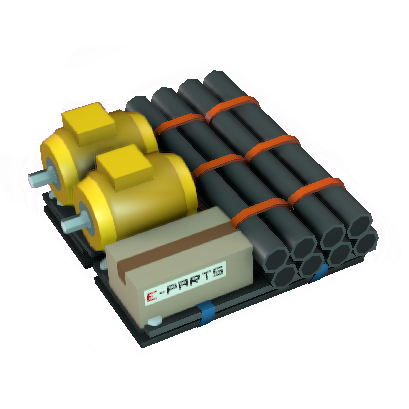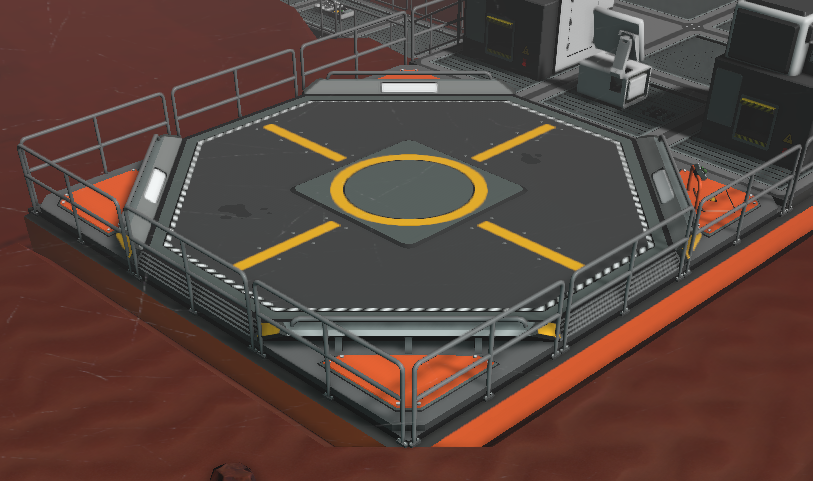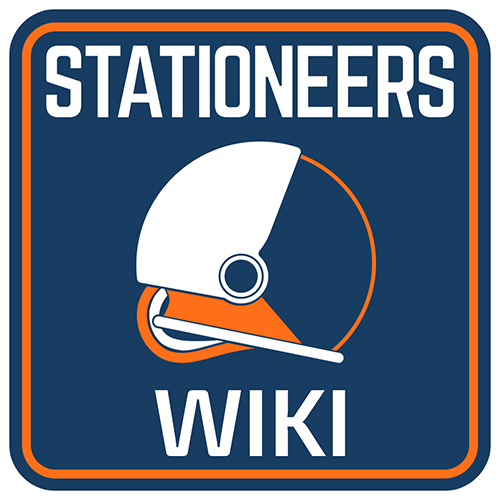Difference between revisions of "Kit (Landing Pad)"
From Unofficial Stationeers Wiki
(Add information to inform the required landing pad since update.) |
(Advised information is out of date) |
||
| Line 27: | Line 27: | ||
<!--T:2--> | <!--T:2--> | ||
| + | ==Note== | ||
| + | This page is out of date including the recipe. Please refer to the ingame stationpedia. | ||
==Purpose== | ==Purpose== | ||
The [[Landing Pad]] provides a place for [[Trader]] shuttles to land. It can be placed on any support structures and must be outside. | The [[Landing Pad]] provides a place for [[Trader]] shuttles to land. It can be placed on any support structures and must be outside. | ||
Revision as of 06:16, 12 January 2024
 | |
| Constructing Options | Landing Pad |
|---|---|
| Properties | |
| Stacks | No |
| Recipe | |
| Created With | Electronics Printer |
| Cost | 5g Gold, 10g Copper, 40g Steel |
 | |
| Operation | |
|---|---|
| Power Usage | 100W |
| Construction | |
| Placed with | Kit (Landing Pad) |
| Placed on | Large Grid 3x3 |
| Stage 1 | |
| Next Stage Construction | |
| Constructed with item | Kit (Landing Pad) |
| Deconstruction | |
| Deconstructed with | Angle Grinder |
| Item received | Kit (Landing Pad) |
| Stage 2 | |
| Deconstruction | |
| Deconstructed with | Hand Drill |
| Item received | 2x Steel Sheet |
Note
This page is out of date including the recipe. Please refer to the ingame stationpedia.
Purpose
The Landing Pad provides a place for Trader shuttles to land. It can be placed on any support structures and must be outside. If a character stays near the centre of the Landing Pad during a landing, the character suit will be broken and will be unable to move until the Trader leaves the planet.
Update
Since trading update 5, Landing Pads in Stationeers have changed to give you more choices. Now you can place them on different tiles with different options. The smallest Landing Pad that works is a 3x3 square, and it needs a centrepiece in the middle. When a Trader shuttle arrives, it lands right in the middle of the centrepiece. The centrepiece has an arrow showing which way the shuttles come and go. It's really important to make sure nothing blocks the arrow's path. That way, the shuttles can move smoothly without any problems. The shuttles usually land and take off at an angle of about 30 degrees.
Once your Landing Pad is ready, you can check the computer terminal to see what size landing pad each available shuttle needs.
There are six types of shuttles, including small, medium, and large ones, with normal and gas options. Shuttles can either use a runway or make a vertical descent to land. Small shuttles need a 3x3 pad, medium shuttles need a 5x5 pad, and large shuttles need a 6x6 pad. Having different pad sizes lets you trade with more Traders who visit your station.
If you want to trade with human Traders, you'll need to create a hangar with air they can breathe. Large shuttles and planes sometimes have human Traders inside. These Traders won't come out and trade unless there's air in the hangar. So, make sure you build a pressurized hangar to accommodate them.
Data Parameters
These are all parameters that can be written with a Logic Writer, Batch Writer, or Integrated Circuit (IC10).
| Parameter Name | Data Type | Description |
|---|---|---|
| Activate | Boolean | Activates the Landing Pad when set to 1. |
| On | Boolean | Turns the Landing Pad on when set to 1. Turns the Landing Pad off when set to 0. |
Data Outputs
These are all parameters, that can be read with a Logic Reader or a Slot Reader. The outputs are listed in the order a Logic Reader's "VAR" setting cycles through them.
| Output Name | Data Type | Description |
|---|---|---|
| Power | Boolean | Returns whether the Landing Pad is turned on and receiving power. (0 for no, 1 for yes) |
| On | Boolean | Returns whether the Landing Pad is turned on. (0 for no, 1 for yes) |
| RequiredPower | Integer | Returns the current watts of power required by the Landing Pad. |
| Error | Boolean | Returns whether the Landing Pad is currently flashing an error. |
